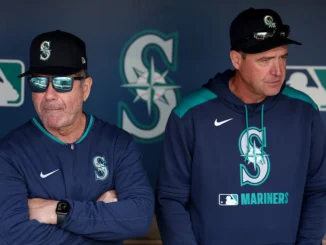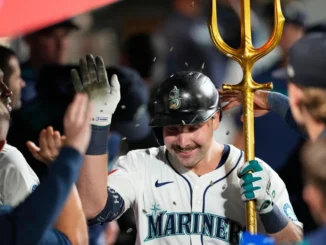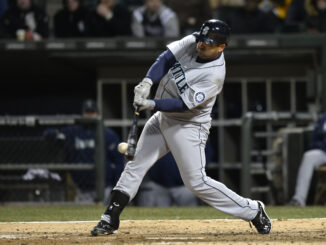
Last weekend, new reports about the latest round of disagreements between Major League Baseball and the MLB Players Association cast new doubts about the possibility of America’s pastime returning in 2020. And like so many discrepancies from the business side of sports, at the heart of this baseball-preventing standoff is money.
The latest proposal by the MLB is 60 games starting July 19th, full prorated salaries, expanded playoffs, and a waving of all grievances. But it’s likely to be rejected and countered, as players say they want 65+ games if they’re going to waive any future grievances about bad faith negotiations.
Additionally, there have been recent rumors on Twitter that at least six (and as many as eight) team owners would rather skip the season entirely, in an attempt to avoid losing money in a compromised season.
“Hearing that six owners that don’t want a season. @Ken_Rosenthal reports 8 or more. Urgency for Manfred to corral his group before that number grows.” – Andy Martino, SNY Network (and Ken Rosenthal, The Athletic)
Conversely, some of the league’s most prominent players are using Twitter to openly ask to get things resolved and start playing immediately:
“Tell us when and where! We are ready!” – Anothony Rizzo, Chicago Cubs
“Rob Manfred and the owners are walking back on their word…AGAIN. The fans do not deserve this. So, I’ll say it one more time, tell us when and where.” – Max Scherzer, Washington Nationals
“Tell us when and where. We’re ready! We’ve been ready! #LetTheKidsPlay” – Rhys Hoskins, Philadelphia Phillies
On top of all of that, both sides are scheduled to hold and (hopefully) resolve their five-year labor union contract negotiations next season, so tensions were already high during this offseason. Much of that strain, it would appear, has spilled directly in to the 2020 dispute.
To read a far more in-depth analysis of the labor dispute, this ESPN article by Jeff Passan is the perfect place to start.
But here we are—almost three months after a ceremonial first pitch that was never thrown, everyone from the MLB’s front office to the players, coaches, stadium staff, and fans are all still waiting. As you might imagine, there’s no shortage of reasons for the continuing delay, but beyond the ongoing labor disputes, the existential challenge baseball faces in 2020 is COVID-19.
Back in early February, while spring training was heating up and pitchers & catchers were first reporting to their teams, the Coronavirus was already ripping through populations on the other side of the world. Within a few weeks, most of the U.S. population began mirroring the MLB’s stoppage—either by enduring a shutdown at home, layoffs at work, or both. But now, three months later, as some states are reopening with flat or even fading infections, several other states who closed too late or opened too early are seeing a dramatic rise in hospitalizations and deaths.
Essentially, some sections of the country would be relatively safe for baseball while some others would definitely not be. The MLB has 32 teams, each from a different city. How do you keep players, coaches, and team staff safe while frequently interacting with hotel/airline/restaurant workers in the process?
You might institute some kind of “social bubble,” with people from the outside rarely interacting with those within (The NBA may use this system to conclude its shortened season). You might even expand it to include player families, but the larger the bubble, the more likely it is to pop.
“You don’t want [your social distance bubble]to get too big. Just about 10 people or less. Beyond that, the risk is an issue.” – Dr. Daniel Griffin, infectious disease specialist
So, that’s not a realistic safety measure by itself. The Seattle Mariners, for example, usually travel with nearly 60 people: 25 players, 27 staff, 5 media. So, well beyond Dr. Griffin’s recommended range.
Testing is another tactic to deploy, as it would allow for quicker detection and isolation of sick players. Paired with contact tracing, it’s conceivable that teams could easily identify and quarantine sick players and any of their close contacts before they infect anyone else.
However, it’s easy to imagine an unlucky team (almost certainly the Mariners) losing half their starting lineup overnight, forcing emergency call-ups from minor league teams that have been mostly shutdown and aren’t nearly ready to support a weakened big-league roster.
In fact, just the other day the MLB announced that multiple players and coaches (unnamed at this time) have tested positive for COVID-19, adding yet another layer of logical defense for those who worried about playing without health protections in place. Or more nefariously, for any secretive owners who would rather not play at all.
The truth is, there’s no way to fully eliminate the risk of contracting COVID-19 until a vaccine is available, but any efforts to test frequently, minimize contact, and keep teams isolated will all help reduce the chances on contracting the Coronavirus.
Another obvious idea, the MLB should require players, coaches, and all team personal wear face masks unless they’re on the field. This idea has received mixed feedback in the media, but at least one player is publicly behind it.
“I’ll be up for anything at this point just to be able to play. If they said, ‘Hey, you can start games [soon], but you have to wear masks.’ If that’s the only thing holding us back then sure, guys would do it.” – Nick Ahmed, Arizona Diamondbacks
As a sport, the MLB has it far easier than the NFL, NBA, NHL or many other leagues due to the relatively contact-free nature of playing baseball. Transmissions between opposing players, for example, would be significantly less-likely during a New York Yankees vs Los Angeles Angels contested slide than during a New York Knicks vs Los Angeles Clippers contested rebound.
Assuming the MLB and Players Association can come to an agreement about the length of the season, player payments, and grievance limitations (big assumption, deep sigh), in my opinion, there would need to be a commitment on both sides to testing, contract tracing, social distancing, and mandatory mask wearing in order to bring baseball back.
Maybe the league could get by with only some of my suggested requirements, but I fear that it wouldn’t be long before player safety concerns eclipsed the product on the field, further threatening the season altogether.
Speaking of a lost season, as a concerning cherry on top of this quarantine cupcake, the threat to baseball isn’t isolated to just this season’s troubles.
Consider this: MLB game attendance has been declining for years (TV viewership actually grew last year), and calls for shorter games and improved online content (among many other ideas) have been well discussed as potential antidotes for a disappearing modern fanbase.
Setting aside a team’s diehard supporters, which aren’t going anywhere, if I do say so myself… If the 2020 season were to be cancelled outright, how many casual fans would return in 2021? It’s reasonable to project a massive decline in baseball fandom across the league that could spell doom for the sport as we know it.
If we learned anything from the recent XFL saga, the rise of a competitor league isn’t outside the realm of possibility. It might be implausible to envision a new baseball league challenging America’s Pastime right now, but if someone can figure out how to reinvent a baseball product that appeals to younger fans in a format that they readily consume, it’ll put a lot of pressure on the MLB to either adapt or die.
So, what is the future of baseball in 2020? It’s clearly hard to say…
After a stressed meeting with Tony Clark, the leader of the Players Association, MLB Commissioner, Rob Manfred said he was no longer confident there would be a 2020 season.
“I think there’s real risk, and as long as there’s no dialogue, that real risk is going to continue. … The owners are 100% committed to getting baseball back on the field. Unfortunately, I can’t tell you that I’m a 100% certain that’s going to happen.’’ – Rob Manfred
Clark, of course, immediately responded.
“Players are disgusted that after Rob Manfred unequivocally told players and fans that there would ‘100%’ be a 2020 season, he has decided to go back on his word and is now threatening to cancel the entire season. This latest threat is just one more indication that Major League Baseball has been negotiating in bad faith since the beginning. This has always been about extracting additional pay cuts from players and this is just another day and another bad faith tactic in their ongoing campaign.” – Tony Clark
If that doesn’t inspire confidence, that’s because it shouldn’t.
There’s only so much time available to baseball before the end of their season would coincide with the NFL’s season, which would essentially erase any fan viewership and interest the MLB managed to cultivate during its shortened season.
The players and owners need to start looking past the profitability of this season, toward the viability of the league itself, and work together to bring baseball back as soon as possible.
The future of the sport is unknown, but the MLB shouldn’t freely take this kind of hit…
You never know. It could be a knockout.




